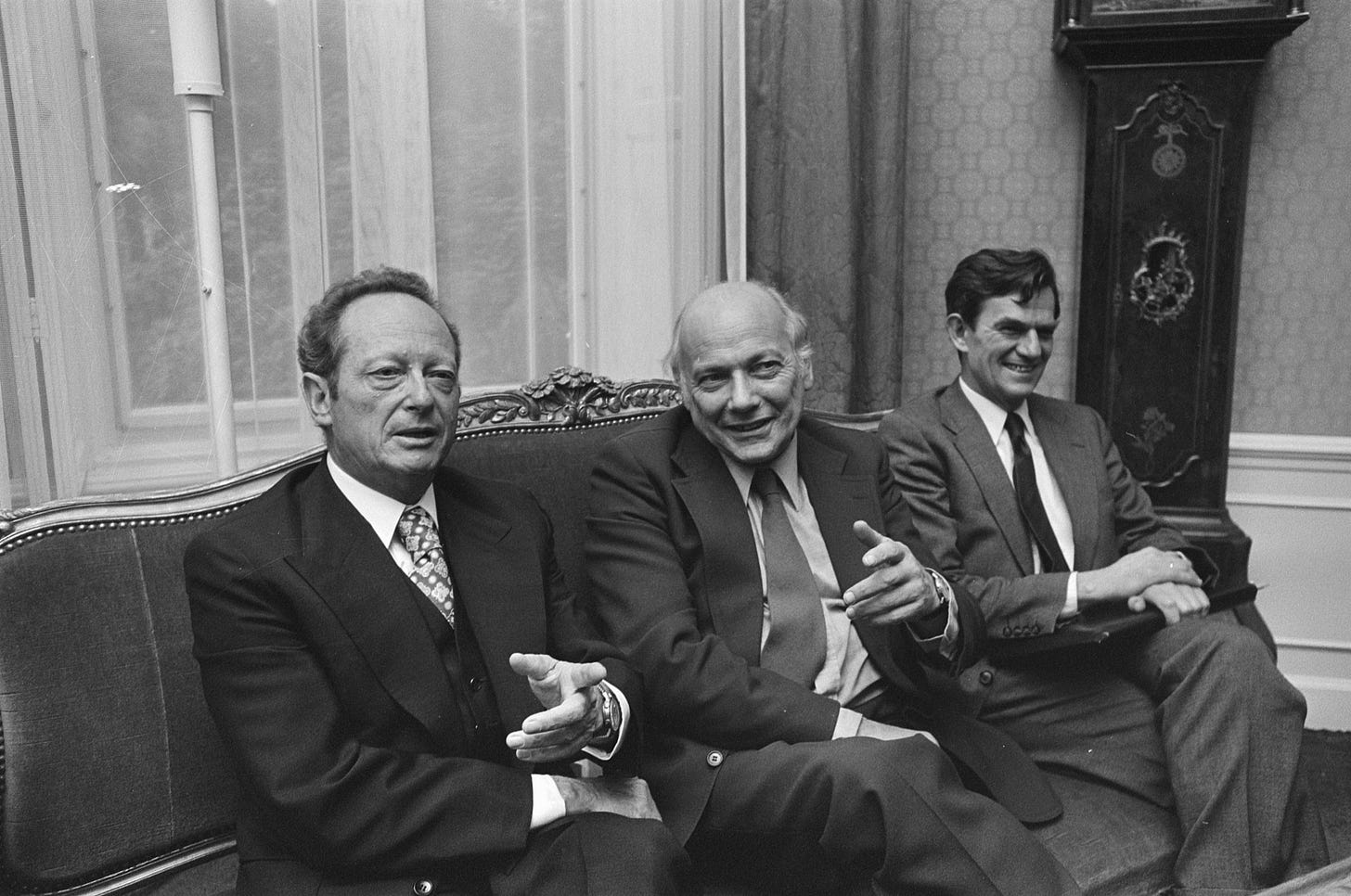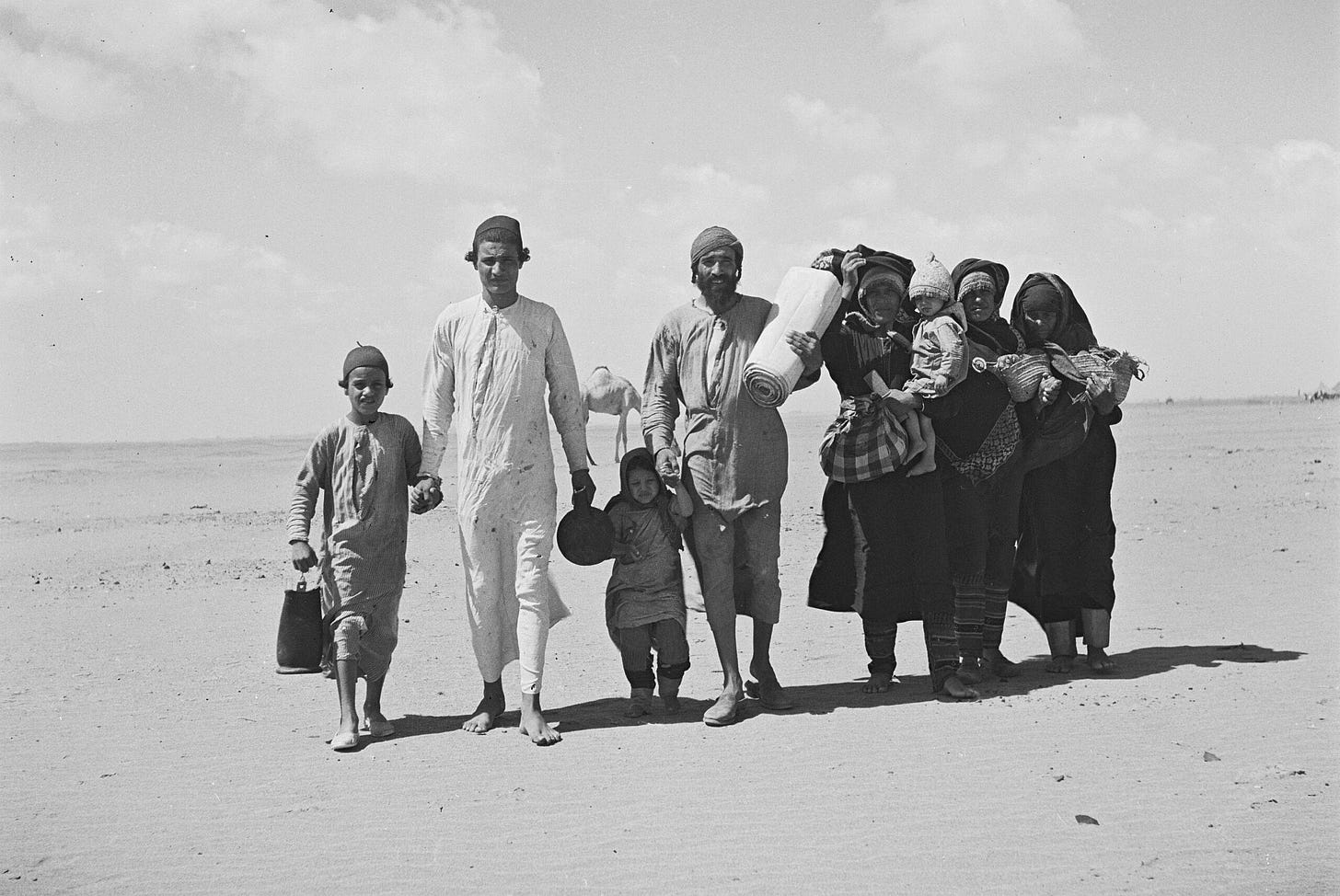Israel’s precarious position is the Jews' perpetual plight.
Here we Jews are again, put in yet another position to fend for ourselves, against age-old hypocrisies, contradictions, and double standards.
Editor’s Note: In light of the situation in Israel — where we are based — we are making Future of Jewish FREE for the coming days. If you wish to support our critical mission to responsibly defend the Jewish People and Israel during this unprecedented time in our history, you can do so via the following options:
You can also listen to this essay if you prefer:
I knew it was bound to happen.
On Sunday, October 8th, just 24 hours after some 3,000 Palestinian terrorists invaded Israel and brutally massacred hundreds of people, while taking hostage more than 200 others, I knew that the news media and social media would quickly turn their “thoughts and prayers” for Israel, into heavily biased empathy for the so-called “innocent Palestinians” and Gaza’s humanitarian crisis (which Hamas and Palestinian allies like Qatar and the United Nations are largely responsible for).
Then, when U.S. President Joe Biden flew to Israel on October 18th, he said all the right things like, “Hamas committed atrocities that recall the worst ravages of ISIS, unleashing pure unadulterated evil upon the world,” and “We will not stand by and do nothing again,” a reference to the United States’ lackluster response during much of the Holocaust.
I have no doubt that Biden meant what he said, but it wouldn’t shock me if he was also trying to attract Jewish and pro-Israel votes for the U.S. presidential election next year. In recent years, Biden’s Democrats have appeared to be far less pro-Israel than their predecessors, and certainly compared to the staunchly pro-Israel Republicans.
Perhaps, Biden and the Democrats were initially sensing that a flamboyant pro-Israel stance could significantly nullify any qualms that the Republican nominee for president could otherwise use as leverage against the Democrats.
Hence why I also knew that it was only a matter of weeks before the United States and other countries would start shifting their public messaging to reveal more private pressure and disagreements in their discussions with Israeli officials, against the backdrop of growing international and domestic outcry about Palestinian casualties amid Israel’s war against Palestinian terror.
Just a few days ago, on November 4th, during the Israeli war cabinet’s meeting, U.S. Secretary of State Antony Blinken told Israeli leaders they must do more to ensure noncombatants in Gaza are not harmed in the fighting between Israel and Palestinian terrorists.
According to a report, Israeli military chief Herzi Halevi countered by telling Blinken there would be even more casualties if the military took the advice of U.S. generals sent to advise Israel on the operation in Gaza.
The report also said that in meetings with Israeli leaders, Blinken stressed American backing for Israel is “wall-to-wall” but that “public opinion” is making it more difficult for the administration to extend such support.
You see, in theory, it’s pretty easy to support Israel and its mission to eradicate Palestinian terror. In reality, this means accepting that there will be plenty of civilian deaths, since terrorism has effectively been part of the Palestinians’ DNA since they decided to become a people in the 1800s.
In some cases, it’s impossibly difficult to distinguish between Palestinian combatants and noncombatants. In other cases, Palestinian terrorists use their fellow people as human shields, and civilian infrastructure (like schools and hospitals) as safe-havens, in some of the most inhumane and sinister ways.
So, if your waning support for Israel’s campaign eventually turns into you questioning Israel at every commotion of more dead Palestinian civilians — the source of which is a Palestinian terrorist organization — then you aren’t very different from the politicians who shared in Jewish sorrow during the Holocaust, but who ultimately refused to bomb the railroad tracks that were used to systematically deport millions of Jews to their deaths.
On one hand, Israel must not bow to Western pressure and its hypocritical games, even if this means putting countries like the United States in their place. There is no question that Israel is far better off with the U.S. and other Western countries on our side, but so too is the U.S. far better off with Israel on their side. And, if Israel didn’t exist, Europe would be feeling the brunt of Islamic fundamentalist terrorism as we speak.
On the other hand, since Israel is a political entity, it has to play the political games. And this is what puts the Jewish state in an impossible position. Politics is not about justice; it’s about populism, and if international pop culture deems Israel to be an oppressive, colonizing country (regardless of any actual facts), politicians across the world who want to win their next elections will cave to their so-called constituents.
Israel, meanwhile, has to deal with the impracticality of its war against Hamas and other Palestinian terrorist groups. If it stops short (or if it is politically pressured to stop short) of eradicating Palestinian terror, this will be a resounding victory for fundamentalist Islam, and terrorists will start planning their next attacks against the Jewish state.
If Israel completes the long, costly, and treacherous work of eradicating Palestinian terror, the result will also be thousands of “innocent Palestinian” deaths which will increasingly anger people across the world. Don’t be surprised if the “peaceful” protests you see now turn violent and vicious.
Israel has to decide which is more essential: To look good in the eyes of the West, or to terrify those in the Middle East. As former Israeli Prime Minister Golda Meir aptly said, “If we have to choose between being dead and pitied, and being alive with a bad image, we’d rather be alive and have the bad image.” I safely presume that most Israeli politicians and everyday Israelis would agree with her today.
And, yet, even if Israel tries to look good in the eyes of the West, it will never be able to successfully do so. For decades, Israel has developed the world’s most humanitarian army. Israelis have unleashed innovation after innovation — from medicine and defense, to hi-tech and agriculture — used by much of the Western world. Israeli first-responders attend to virtually every major natural disaster, wherever it is in the world.
But here Israelis are again, defending ourselves against the Palestinian pogrom on October 7th — which involves going above and beyond to ensure such a tragedy won’t happen again. And here, again, is much of the West, scolding Israel, even as they enjoy from Israel’s existence, and even if Israel stands for much of the West’s values in one of the most dangerous and anti-West regions on Earth.
That’s why, when push comes to shove, Israel must not bow to Western pressure and its hypocritical games. And, if this pressure continues to grow, maybe Israel should think about distancing itself from certain parts of the West. After all, Israel doesn’t want to be the overly progressive Western country that many people, including some Jews, want it to be.
And, frankly, I’m darn happy that Israel doesn’t want to be an overly progressive Western country, because democracies who defend overly progressive values are weak, and weakness is a surefire recipe for extinction in the Middle East (and potentially other areas of the world, like Europe).
Now that I think about it, certain Western countries should look to Israel as a role model state, even with its deficiencies, missteps, and weaknesses.
Whereas many people in the West are secular, most Israelis are at least traditionally observant, ranging from what the outside world calls “conservative Judaism” to the ultra-Orthodox variant. In many cases, this is less to do with God and more to do with historical traditions that are meaningful for Israelis, and Jews by extension, to uphold and cherish.
As Yigal Alon, the former Israeli military commander and politician, used to say: “A man without a past, his present is poor, and his future is shrouded in fog.”
Whereas many people in the West believe in “separation of church and state,” most Israelis are receptive to some of their tax dollars being used to fund quintessentially religious institutions, such as synagogues, cemeteries, rabbinical ministries, and parts of the education system that deal with Jewish history and religion.
Whereas many people in the West think that militaries should be defunded because “I thought there weren’t any more wars,” most Israelis favor a powerful army in which they and their kids proudly serve, because “we live in the Middle East and aren’t ignorant about history.”
Whereas Western cultures uphold, at least in more recent years, individualism and capitalism, most Israelis prefer community and socialism (such as social healthcare, affordable education, and welfare).
Whereas many people in the West want democracy through and through, most Israelis want a Jewish democracy — in which Jews remain the majority, so that the Jewish nature of the state remains intact. After all, what else would you expect from a country that was founded on a return to our indigenous homeland, and on being a safe-haven for any Jew, everywhere, now and in the future?
Even with all this said, Israel has, in recent years, lost some of its way. There are many reasons for this, and one of them is Benjamin “Bibi” Netanyahu. After the 2003 Israeli legislative election, Prime Minister Ariel Sharon offered the finance ministry to Bibi, in what many observers regarded as a surprise move.
Some pundits speculated that Sharon made the move because, given Bibi’s demonstrated effectiveness as Foreign Minister in the previous parliament, Sharon deemed him a political threat. By placing him in the Finance Ministry during a time of economic uncertainty, in part because of the Second Intifada, Sharon could theoretically diminish Netanyahu’s popularity.
Netanyahu accepted the new appointment, and Sharon and Netanyahu came to an agreement that Netanyahu would have complete freedom as Finance Minister, and Sharon would back all of his reforms, in exchange for Netanyahu’s silence over Sharon’s management of Israel’s military and foreign affairs.
As Finance Minister, Bibi devised a more politically conservative economic plan in order to restore Israel’s economy from one of its historical low points. He claimed that a bloated public sector and excessive regulations were largely responsible for stifling economic growth, so his plan involved a move toward more liberalized markets.
Ultimately, unemployment declined while economic growth soared, the debt-to-GDP ratio dropped to one of the lowest in the world, and foreign investment reached record highs. As the Israeli economy started booming and unemployment fell significantly, Netanyahu was widely credited by commentators as having performed an “economic miracle” at the end of his tenure.
In 2007, Bibi was reelected as chairman of the political party, Likud, and became its candidate for the post of prime minister. Two years later, he was elected the prime minister of Israel, a position he held (following additional re-elections) since 2021. (Term limits on prime ministers do not exist in Israel.)
In January 2017, Bibi was investigated and questioned by Israeli police in two interconnected cases. In one case, he was suspected of having obtained inappropriate favors from businessmen. And in the other one, Bibi was alleged to try to strike a deal with the publisher of the Yedioth Ahronot newspaper group, Arnon Mozes, to promote legislation to weaken Yedioth’s main competitor, Israel Hayom, in exchange for more favorable coverage of Netanyahu.
In August 2017, Israeli police confirmed for the first time that Netanyahu was suspected of crimes involving fraud, breach of trust, and bribes in these cases. The next day, it was reported that the Prime Minister’s former chief of staff, Ari Harow, had signed a deal with prosecutors to testify against Netanyahu in these cases.
In February 2018, Israeli police recommended that Netanyahu be charged with corruption. According to a police statement, sufficient evidence exists to indict the prime minister on charges of bribery, fraud, and breach of trust in the two cases. Netanyahu responded that the allegations were baseless and that he would continue as prime minister. In November 2018, it was reported that Economic Crimes Division Director Liat Ben-Ari recommended indictment for both cases.
In February 2019, the Israeli attorney general announced his intent to file indictments against Netanyahu on bribe and fraud charges in three different cases. Bibi was formally indicted in November 2019 and, if convicted, he could face up to 10 years in prison for bribery and a maximum of three years for fraud and breach of trust. Netanyahu is the first sitting prime minister in Israel’s history to be charged with a crime.

Albert Einstein, who was a proud Jew and involved himself in many Jewish causes, including the foundation of the Hebrew University of Jerusalem, had expressed reservations about Jews exercising state power, fearing that it would be corrupting and a turn away from the spiritual.
Netanyahu isn’t the only Israeli politician to prove Einstein right; Aryeh Deri was convicted of taking bribes while serving as Israel’s interior minister, and former prime minister Ehud Olmert served 16 months of a 27-month prison sentence for fraud, breach of trust, and tax evasion.
Einstein believed in the historical Land of Israel as a modern-day Jewish homeland, but not as a separate state. He felt that Zionists, by asking for more, were taking an overwhelmingly stubborn approach, which would only “damage our cause.”
What Einstein wanted to see is a “secured binational status in Palestine with free immigration,” adding that it defied common sense to “ask to be given the political rule over Palestine where two-thirds of the population are not Jewish.” It turns out, Einstein was one of other intellectuals, including Judah Magnes and Martin Buber, who favored a binational state for Jews and Arabs alike.
If we were to think through “secured binational status in Palestine with free immigration,” naturally the question arises: Who exactly would govern them? In my mind and probably yours too, democracy would be the answer. And with a free immigration policy, Arabs would quickly turn themselves into the vast majority, since they statistically outnumber the amount of Jews in the world by a heavy margin.
Do we really think that, with a vast Arab majority, Jews would be welcome to stay? Do we really think that, with a vast Arab majority, Jews would be able to “live their best Jewish lives?” Do we really think that, with a vast Arab majority, Jews would be fully and equally protected under existing and future laws?
Many people do not know that Islamic cultures, while not as virulent in their expression of antisemitism as Christian ones, still proposed that Jews were second-class citizens who were taxed disproportionately and lived lives of precarious appeasement to whomever was in power.
Around the sixth century, in the expanding Arab world, Jews had to pay fees in exchange for safeguarding their life and property, as well as for the right to worship unmolested according to their conscience. Jews were also to conduct themselves with the demeanor and behaviors befitting a subject population.
They were never to strike a Muslim. They were not to carry arms, ride horses, or use normal riding saddles on their mounts. They were neither able to build new places of worship, nor repair old ones. They were not to hold public religious processions (including funeral processions) nor pray too loudly.
Most definitely, they were not to proselytize. They had to wear clothing that distinguished them from the Arabs. This insistence on social inferiority may be traced, at least in part, to the Jew’s rejection of both Jesus as Savior and Mohammed as Prophet, and to fears that Jewish ideas — Jewish “resistance” — would contaminate the loyal followers of Jesus and Mohammed.
While these two religions ignited the initial flames of antisemitism and spread it throughout their growing empires, ruling classes have fueled the fire when it has been expedient for them.
This has worked in two main ways: One, Jews were forbidden in many places from owning land and from working in positions of skilled labor. They were, however, allowed to work with money, because money, moneylending, and money collecting were jobs full of risk and stigma, considered to be lowly and filthy.
Jews entered these ventures out of necessity because they were prevented from working in the guilds that were necessary to succeed in other trades, but their success in the moneylending and money-collecting fields, coupled with the illusion of “power over” poor peasants which these positions presented, became another reason for the masses to hate them.
It was at this time that Jews became the public face of the oppressor. The positions they occupied: tax collectors, foremen, innkeepers, and liquor distributors for the large landowners and feudal elite. To the ordinary serf or peasant, these Jews seemed to have immense power. It was to them that one had to pay the taxes or levies, to them that one paid for the goods that were being brought in from other areas, and to them that one had to appeal when facing arbitrary decisions of the landowners.
The stigma and hate attached to these positions landed on top of the suspicion and mistrust Jews already carried due to their historical convictions and status as outsiders. It could be argued that antisemitism began to have a life of its own during Medieval Europe, capable of being spontaneously awakened simultaneous to social and economic unrest, a deeply and intricately imbedded construct in the (usually) non-Jewish psyche, mostly unconscious as a construct having to do with money, religion, and taboo is likely to be.
By the 1500s and into the 1900s, as antisemitism engulfed Europe, the Jews weren’t garnering much political support. Even those in what was becoming “the West” didn’t do much to accommodate the Jewish plight leading up to and during the Holocaust, not because everyone was a Nazi, but because of the perceived political risks.
And so, here we Jews are again, put in another position to fend for ourselves, against age-old hypocrisies, contradictions, and double standards. What is only new now is that we have a state and, thus, political responsibility to both Israeli citizens and our partners across the world.
This creates an exponentially impossible dichotomy between, on one end, waning international endorsement of our war on Palestinian terror; and, on the other end, ensuring the vast majority Israelis will be satisfied domestically with a resounding victory that sees justice unequivocally served and security painstakingly restored.
Of course, this assumes that the war remains between Gaza and Israel, geographically speaking. Once Iran senses that international support is no longer potent, the Iranians could open up additional fronts on Israel’s northern borders with Lebanon and Syria, and across the Red Sea in Yemen. With little or no real international support, Israel could be left to deal with these fronts alone, and Iran itself could be waiting in the waters.
By then, Europe will be fractured in its response, and the U.S. presidential election cycle will be in full swing, making it increasingly difficult for Biden to act decisively without hurting the Democrats’ chances of re-election.
Meanwhile, Iran and other theocratic governments in the Middle East will realize that their tribalism and martyrdom can easily overpower the West’s largely virtueless emphasis on individuality and economics.
Some of us (perhaps naively) thought that the creation of the State of Israel would be the end of endless Jewish suffering, that the centuries upon centuries of Jewish agony and despair would be totally worth every ounce of it so long as it presented us with our own country, for our own people, with our own traditions and customs, in our indigenous homeland.
The reality, at least up until now, is more in line with what Israeli novelist and author, Amos Oz, famously wrote:
“When my father was a boy in Poland, streets of Europe were covered with graffiti. ‘Jews, go back to Palestine.’ When my father revisited Europe 50 years later, the walls had new graffiti. ‘Jews, get out of Palestine.’”
So, as the West recklessly becomes more and more divided, thus deepening Israel’s precarious position, thus perpetuating the centuries-old Jewish plight, we Jews will do what we’ve always done best: hope and pray for a miracle.






All sad, all scary, all true, Joshua. Thanks for articulating the conundrums so well. When you able, give your readers some hope, too. Thanks!